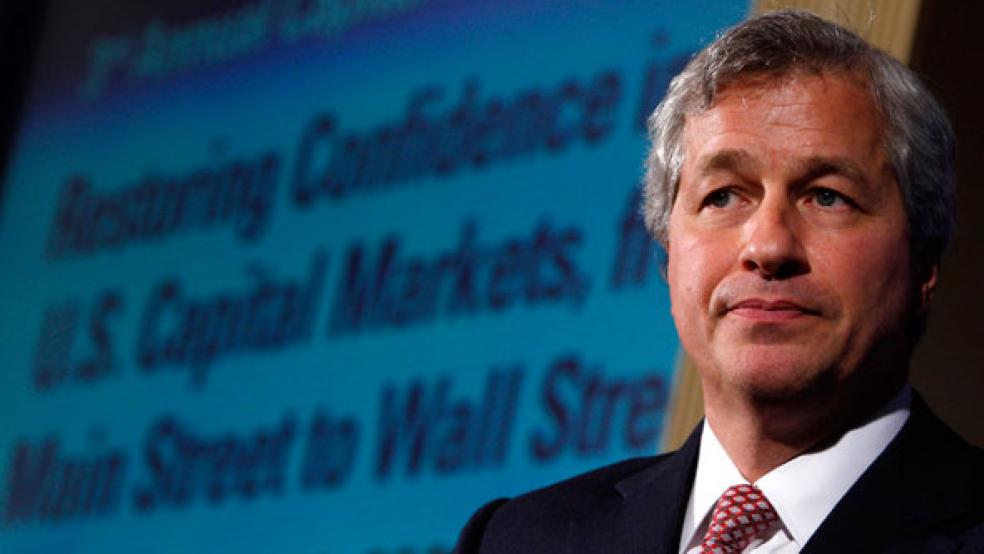It’s not quite the showdown at the O.K. Corral, but a low-key tug of war between J.P. Morgan Chase (NYSE: JPM) and proxy advisers Institutional Shareholder Services (better known as ISS) and Glass Lewis & Co. has ratcheted up another notch in its intensity in the last couple of days.
ISS earns some of its money by providing advice to professional money managers on how they should cast their ballots on critical shareholder votes during annual meetings every spring. Many listen, and that’s why Morgan already was rattled by the fact that ISS and Glass Lewis are recommending that investors support a shareholder proposal that Jamie Dimon be forced to relinquish his role as chairman of the company.

Last year, the same suggestion won support from 40 percent of those who cast their votes, and this year it’s getting some other heavyweight backing from the likes of BlackRock and Fidelity in light of reports on how the bank handled the London Whale trading losses unveiled just over a year ago.
Now ISS and Glass Lewis have turned up the heat by arguing that shareholders should vote against the re-election of members of the board of directors. ISS recommended shareholders withhold support for three board members on the risk committee – committee chair James Crown, David Cote and Ellen Futter –arguing that in response to the trading losses, “the board appears to have been largely reactive, making changes only when it was clear that it could no longer maintain the status quo.” Glass Lewis went a bit further, recommending that six of the board’s 11 members be ousted, including three members of the audit committee: James Bell, Crandall Bowles and Laban Jackson.
The risk committee, ISS says, “should not be exonerated from its duty to perform a critical oversight function simply based on the Board Review Committee’s assessment that the risks posed by the positions in the synthetic credit portfolio were not appropriately elevated.” In other words, just because the directors (including Futter, a museum director) don’t get the kind of information they need to make the right call at the right time doesn’t mean they should be able to throw their arms up in the air later and say, “whoops, sorry!”
The question of how much risk big banks are taking these days and how well they are able to manage it is at the forefront of pretty much everyone’s mind within the financial markets. It has ramifications for legislators, under pressure to break up the biggest banks, and for investors, keen to avoid investing in a bank that struggles to cope with the risks it needs to take in order to generate a respectable return on equity.
ISS, for its part, isn’t stopping at making ad hoc recommendations on specific proxy proposals, however. Earlier this year, it introduced its Governance QuickScore, a quantitative ranking that tries to capture in a single number the extent to which a company’s governance structure creates risk for its shareholders, ranging from how the board is structured to its pay policies.
Of course, trying to capture and quantify risk is a bit like trying to pin jello to wall: it’s a frustrating and ultimately futile endeavor. But the scores that ISS has awarded the major financial institutions offer an interesting starting point for thought and debate – and shed some light on the relative returns of these financial stocks over the last 12 months.
J.P. Morgan Chase, which emerged as one of the most notable survivors of the market meltdown, earns a QuickScore of only 6 for its governance, with 1 being the best rating and 10 the lowest possible. (The score reflects the decile in which ISS belongs, with 1 representing the top 10 percent of all companies in the region.) The bank, the rating seems to suggest, may have done a great job navigating the last bout of turbulence, but ISS doesn’t believe that its governance structure is as robust as it could be to confront whatever might be looming on the horizon next.
Goldman Sachs (NYSE: GS) – the other big “winner” among the pre-crisis financial institutions – also scores a 6, as does Morgan Stanley (NYSE: MS), which has had more of a struggle to repair its business.
At the other end of the spectrum are some of the surviving institutions that have had to battle hardest to restructure their business, including Citigroup (NYSE: C), in which the government ended up owning a stake for two years to ensure the bank’s very survival. Perhaps adversity did end up creating a better-run institution: Not only did Citi pass its most recent Federal Reserve “stress test” with flying colors, emerging with more excess regulatory capital in the event of a hypothetical future market crisis, but the bank earns a 2 from ISS on its governance – the highest rating awarded to any of the big banks. Bank of America Merrill Lynch (NYSE: BAC), the other megabank whose business model has been questioned, also fared significantly better than JP Morgan Chase or Goldman, ranking in the third decile, while Wells Fargo (NYSE: WFC) also registered a QuickScore of 2.
While the scores measure governance risk, not necessarily the overall risks these banks carry as investments, it is intriguing to ponder the way these scores seem to mirror how the market has treated these six financial institutions over the last 12 months. To some extent, the outperformance of Bank of America (up 66 percent) and Citigroup (up 50 percent) reflects their later recovery. Meanwhile, the relative underperformance of JPMorgan Chase (up 15.4 percent) can be traced to the fact that it, like Goldman Sachs (up 36.2 percent), is now bumping up against the limitations to its future growth imposed by the new regulatory regime. /node/61076
The point is that apparently esoteric and tricky-to-monitor stuff like governance matters. Creating a corporate culture focused on risk – both on how to take it on in order to generate profits, and how to manage it so that it doesn’t sweep the company away on a tidal wave of losses – is one of the biggest challenges confronting a company’s management and its board, and it’s important to ask whether the board members are up to the task not just in the wake of events like the London Whale trading losses but today, before anything goes amiss.
Should investors respond in a knee-jerk fashion to recommendations by ISS or any other similar consulting service? Absolutely not. Ideally, every portfolio manager at the likes of BlackRock or Fidelity will be able to take the time to make an informed decision on questions such as splitting the CEO and chairman roles or which directors are qualified to oversee risk policies at a giant bank these days. In reality, however, many find it difficult to take the time to ponder these issues, and it’s good to have the likes of ISS and Glass Lewis reminding us, even if it’s only once a year, that they can be directly relevant to just how well your holdings fare on a day-to-day basis.






